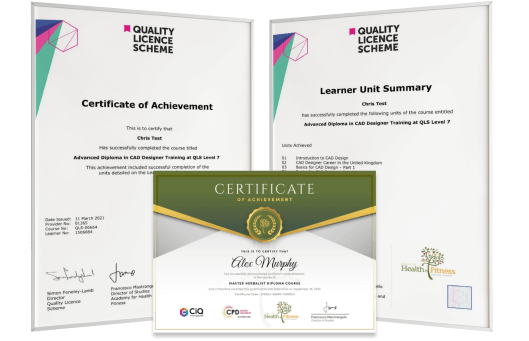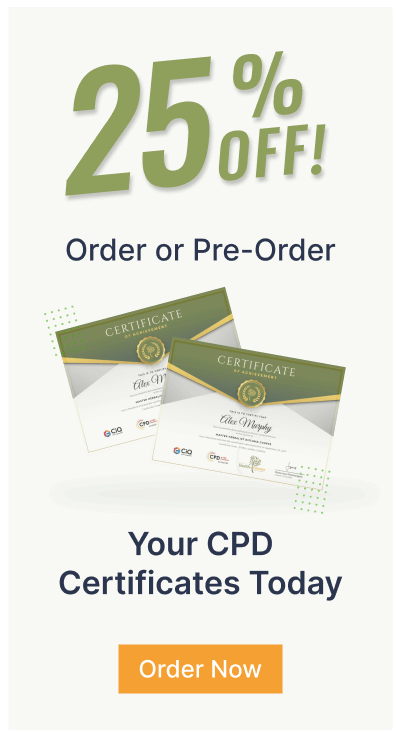Advanced Diploma in Counselling and Psychology at QLS Level 7
The Advanced Diploma in Counselling and Psychology at QLS Level 7 is an e-learning programme designed for individuals seeking to learn psychological theories and counselling techniques. Endorsed by the QLS Level 7 (Quality Licence Scheme), it improves career prospects in the counselling field. With 24/7 access to dedicated student support, this course equips learners with the skills and knowledge essential for effective practice in various therapeutic settings.
Advanced Diploma in Counselling and Psychology at QLS Level 7
Exclusive Deal! 94% Off, Today Only!



1 Year Access
Level 7
3130 Students
-
3 weeks, 4 days
Buy 1 or more contact sale
£415£25 ex VAT- 1 year
- Level 7
- Number of Units34
- Number of Quizzes2
- 3 weeks, 4 days Gift this course
 14-Day Money-Back Guarantee
14-Day Money-Back Guarantee
The Advanced Diploma in Counselling and Psychology at QLS Level 7 course offers a comprehensive exploration of the vital role counsellors play in supporting those facing emotional and psychological challenges. It provides learners with the advanced tools, techniques, and therapeutic approaches needed to effectively address complex mental health issues, from anxiety, stress, and trauma, to personality and mood disorders, including depression and substance abuse.
Throughout this Counselling and Psychology course, you’ll engage with 32 carefully structured modules, covering key areas such as Dynamic Psychotherapy, Legal, Cultural, and Ethical Considerations, Family Counselling, and Cognitive Behavioural Therapy (CBT). Each module is designed to deepen your understanding of mental illness, and you’ll learn how to support clients through conditions like childhood psychiatric disorders, and crisis situations. This qualification doesn’t just focus on theory; you’ll also develop critical practical skills like communication, empathy, and active listening, which are essential for establishing trust and building strong therapeutic relationships with clients.
This course is perfect for those looking to develop a solid foundation in counselling while gaining essential knowledge that are crucial for real-world application.
Learning outcomes:
Upon completing this Advanced Diploma in Counselling and Psychology at QLS Level 7, you will be able to:
- Understand the roles and responsibilities of professional counsellors.
- Apply various counselling theories and models to real-world scenarios.
- Recognize and address psychiatric disorders in children and adolescents.
- Implement psychotherapy and dynamic psychotherapy techniques.
- Counsel clients facing trauma, substance abuse, and crisis situations.
- Address family-related legal issues and conflicts through family counselling.
- Apply communication skills with empathy to improve client-counsellor relationships.
- Assist clients in crisis with appropriate intervention strategies.
Who is This course for?
This course is ideal for:
- Aspiring counsellors and psychologists who want to expand their knowledge.
- Mental health professionals seeking advanced techniques in counselling.
- Educators and social workers dealing with children and adolescent mental health issues.
- Individuals interested in family counselling, trauma therapy, or crisis intervention.
Certification
Endorsed Certificate from the Quality Licence Scheme
After successfully completing the course, learners will be able to order an endorsed certificate as proof of their new achievement. Endorsed certificates can be ordered and get delivered to your home by post for only £129. There is an additional £10 postage charge for international students.
CPD Certification
After successfully completing the assessment of this course, you will qualify for the CPD Certificate as proof of your continued skill development. Certification is available in PDF format, at the cost of £9, or a hard copy can be sent to you via post, at the cost of £15.
Assessment
For assessing your learning, you have to complete an automated MCQ exam. It is required for the students to score at least 60% to pass the exam and fulfil the Quality Licence Scheme-endorsed certificate criteria. Learners can apply for the certificate after they clear the exam.
There are assignment questions provided at the end of the course. You are suggested to complete the questions to enrich your understanding of the course. You can complete this according to your preferred time. The expert tutor will provide feedback on your performance after assessing your assignment.
Job Opportunities
Upon completing the Advanced Diploma in Counselling and Psychology at QLS Level 7, you will unlock a range of rewarding career opportunities in the mental health and counselling sectors. This qualification equips you with the advanced skills and knowledge required to pursue roles in various settings, including private practices, healthcare facilities, educational institutions, and community organisations. Some of the key job roles you can explore include:
Licensed Counsellor: Provide therapeutic support to individuals, families, and groups facing emotional, behavioural, or mental health challenges.
Psychotherapist: Work with clients to address deep-rooted psychological issues through various therapeutic approaches, including dynamic psychotherapy and cognitive behavioural therapy (CBT).
Mental Health Advisor: Offer guidance and support to individuals dealing with mental health issues, assisting them in managing stress, anxiety, and depression.
Family or Couples Therapist: Help families and couples navigate relational conflicts, domestic issues, and personal challenges through specialised counselling techniques.
Crisis Intervention Specialist: Respond to immediate mental health crises, offering support and intervention for clients dealing with trauma, self-harm, or suicidal ideation.
Substance Abuse Counsellor: Assist clients in overcoming addiction and substance abuse, helping them to rebuild their lives through focused counselling and support.
Life Coach: Guide individuals in achieving personal and professional goals, helping them to overcome obstacles, build confidence, and create meaningful life changes.
School Counsellor: Support children and adolescents within an educational setting, helping them to deal with emotional, behavioural, and mental health issues that impact their well-being and academic success.
These roles not only offer a fulfilling career path but also provide the opportunity to make a significant difference in people’s lives, helping them navigate complex emotional challenges and achieve improved mental health and well-being.
Frequently Asked Questions
Counselling psychologists help individuals cope with emotional, social, and psychological challenges by using evidence-based therapeutic approaches. They work with clients facing issues such as anxiety, depression, trauma, and relationship conflicts. Their role includes assessing clients' mental health, providing therapy, and promoting overall well-being.
While psychology is the broader study of the mind, behaviour, and mental processes, counselling psychology focuses specifically on helping people navigate emotional and mental health issues. Counselling psychologists are trained to provide therapeutic interventions for personal, social, and emotional challenges, whereas general psychologists may specialise in various fields like cognitive psychology or research.
A psychology and counselling degree is an academic programme that combines the study of psychological theories with practical counselling skills. Students gain a deep understanding of mental health, human behaviour, and therapeutic approaches, preparing them for careers in mental health and counselling.
Graduates can pursue various career paths, including roles such as counselling psychologist, therapist, social worker, mental health consultant, or academic researcher. Opportunities exist in healthcare, education, and private practice settings.
Entry requirements may vary by institution, but typically include A-levels or equivalent qualifications in relevant subjects. Some programs may also require prior experience in a healthcare or support role.
Typically, a bachelor's degree takes three to four years to complete, while a master's degree can take an additional one to two years, depending on the program structure and whether the student studies full-time or part-time.
Yes, many institutions offer online or blended learning options for psychology and counselling degrees. This flexibility allows students to balance their studies with other commitments.
Students typically have access to academic support, including tutoring, counselling services, and resources for mental health and wellbeing throughout their studies.
Assessments may include written assignments, examinations, practical demonstrations, and reflective journals, depending on the course structure and module requirements.
Yes, graduates will receive a degree certificate, which is widely recognised in the field of psychology and counselling.
Course Curriculum
| Module 01: Counselling and Counsellors | |||
| Counselling and Counsellors | 00:15:00 | ||
| Module 02: Theories and Models of Counselling (Part 1) | |||
| Theories and Models of Counselling (Part 1) | 00:15:00 | ||
| Module 03: Theories and Models of Counselling (Part 2) | |||
| Theories and Models of Counselling (Part 2) | 00:15:00 | ||
| Module 04: Legal, Cultural and Ethical Issues in Professional Counselling | |||
| Legal Cultural and Ethical Issues in Professional Counselling | 00:15:00 | ||
| Module 05: Forms of Psychotherapy | |||
| Forms of Psychotherapy | 00:13:00 | ||
| Module 06: Counselling and Psychotherapy | |||
| Counselling and Psychotherapy | 00:13:00 | ||
| Module 07: Dynamic Psychotherapy | |||
| Dynamic Psychotherapy | 00:31:00 | ||
| Module 08: Childhood and Adolescent Psychiatric Disorders | |||
| Childhood and Adolescent Psychiatric Disorders | 00:25:00 | ||
| Module 09: Counselling Children and Adolescents in Schools | |||
| Counselling Children and Adolescents in Schools | 00:23:00 | ||
| Module 10: Counselling Trauma and Substance Abuse | |||
| Counselling Trauma and Substance Abuse | 00:20:00 | ||
| Module 11: Counselling Stress and Anxiety Disorders | |||
| Counselling Stress and Anxiety Disorders | 00:32:00 | ||
| Module 12: Counselling Personality Disorders | |||
| Counselling Personality Disorders | 00:24:00 | ||
| Module 13: Counselling Mood Disorders and Depression | |||
| Counselling Mood Disorders and Depression | 00:25:00 | ||
| Module 14: Counselling Eating & Sleeping Disorders | |||
| Counselling Eating & Sleeping Disorders | 00:49:00 | ||
| Module 15: Life Coaching and Career Counselling | |||
| Life Coaching and Career Counselling | 00:23:00 | ||
| Module 16: Introduction to Family Law | |||
| Introduction to Family Law | 00:22:00 | ||
| Module 17: Framing Family Law | |||
| Framing Family Law | 00:23:00 | ||
| Module 18: Marriage in Family Law | |||
| Marriage in Family Law | 00:19:00 | ||
| Module 19: Domestic Violence | |||
| Domestic Violence | 00:27:00 | ||
| Module 20: Couple and Family Counselling | |||
| Couple and Family Counselling | 00:32:00 | ||
| Module 21: Conflict Resolution | |||
| Conflict Resolution | 00:17:00 | ||
| Module 22: Pre-Marital Counselling | |||
| Pre-Marital Counselling | 00:20:00 | ||
| Module 23: Affairs | |||
| Affairs | 00:23:00 | ||
| Module 24: Apology & Forgiveness | |||
| Apology & Forgiveness | 00:19:00 | ||
| Module 25: Adapting to Changes | |||
| Adapting to Changes | 00:19:00 | ||
| Module 26: Counselling Self-Harm and Suicide | |||
| Counselling Self-Harm and Suicide | 00:21:00 | ||
| Module 27: Engaging and Assessing the Patients | |||
| Engaging and Assessing the Clients | 00:17:00 | ||
| Module 28: Helping the Client in Crisis | |||
| Helping the Client in Crisis | 00:13:00 | ||
| Module 29: Crisis Intervention | |||
| Crisis Intervention | 00:17:00 | ||
| Module 30: Low Intensity CBT Treatment | |||
| Low Intensity CBT Treatment | 00:15:00 | ||
| Module 31: Medication and Therapy in the Treatment of Mental Illness | |||
| Medication and Therapy in the Treatment of Mental Illness | 00:31:00 | ||
| Module 32: Communication Skills and Empathy in Counselling | |||
| Communication Skills and Empathy in Counselling | 00:17:00 | ||
| Assignment | |||
| Assignment – Advanced Diploma in Counselling at QLS Level 7 | 3 weeks, 3 days | ||
| Mock Exam | |||
| Mock Exam – Advanced Diploma in Counselling at QLS Level 7 | 00:20:00 | ||
| Final Exam | |||
| Final Exam – Advanced Diploma in Counselling at QLS Level 7 | 00:20:00 | ||
| Order Your Certificate | |||
| Claim Your QLS Certificate | 00:00:00 | ||









 22661
22661 
